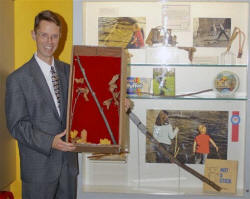 |
Other
News... sponsored by Richardson Repair |

 Toy Hall of Fame points to new addition: the stick
Toy Hall of Fame points to new addition: the stick
[November 07, 2008]
ROCHESTER, N.Y. (AP)
--
The lowly stick, a universal plaything powered by a child's imagination, landed in the National Toy Hall of Fame on Thursday along with the Baby Doll and the skateboard.
|
The three were chosen to join the Strong National Museum of Play's lineup of 38 classics ranging from the bicycle, the kite and Mr. Potato Head to Crayola crayons, marbles and the Atari 2600 video game system. Curators said the stick was a special addition in the spirit of a 2005 inductee, the cardboard box. They praised its all-purpose, no-cost, recreational qualities, noting its ability to serve either as raw material or an appendage transformed in myriad ways by a child's creativity. "It's very open-ended, all-natural, the perfect price -- there aren't any rules or instructions for its use," said Christopher Bensch, the museum's curator of collections. "It can be a Wild West horse, a medieval knight's sword, a boat on a stream or a slingshot with a rubber band. ... No snowman is complete without a couple of stick arms, and every campfire needs a stick for toasting marshmallows. "This toy is so fantastic that it's not just for humans anymore. You can find otters, chimps and dogs -- especially dogs -- playing with it." Longevity is a key criterion for getting into the hall, which the museum acquired in 2002 from A.C. Gilbert's Discovery Village in Salem, Ore. Each toy must not only be widely recognized and foster learning, creativity or discovery through play, but also endure in popularity over generations. While dolls have been around since ancient times, the Baby Doll with its realistic newborn features emerged in the late 18th century and has been through hundreds of incarnations. Today's models can crawl, drink and even talk via voice-activated commands. "It is generally thought of as lovable and cuddly, even if it can doze off or cry during play," said Susan Asbury, an associate curator. "Toy designers have spent decades making it ever more lifelike and true to form. ... It promotes imaginative play and brings out the nurturing side in all of us." The first skateboarders in the 1950s cruised walkways on California beaches trying to match the speed, turns and tricks performed by surfers they watched offshore. Apart from being fun, practicing ollies, grinds and primos "promotes individualism ... artistic expression and it's also very athletic," skateboard icon Tony Hawk said in a video message played at the induction ceremony. ___ On the Net: |

